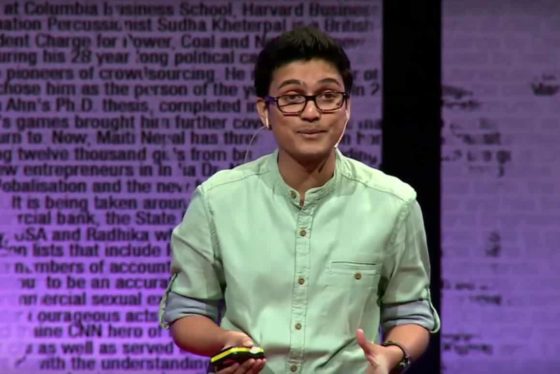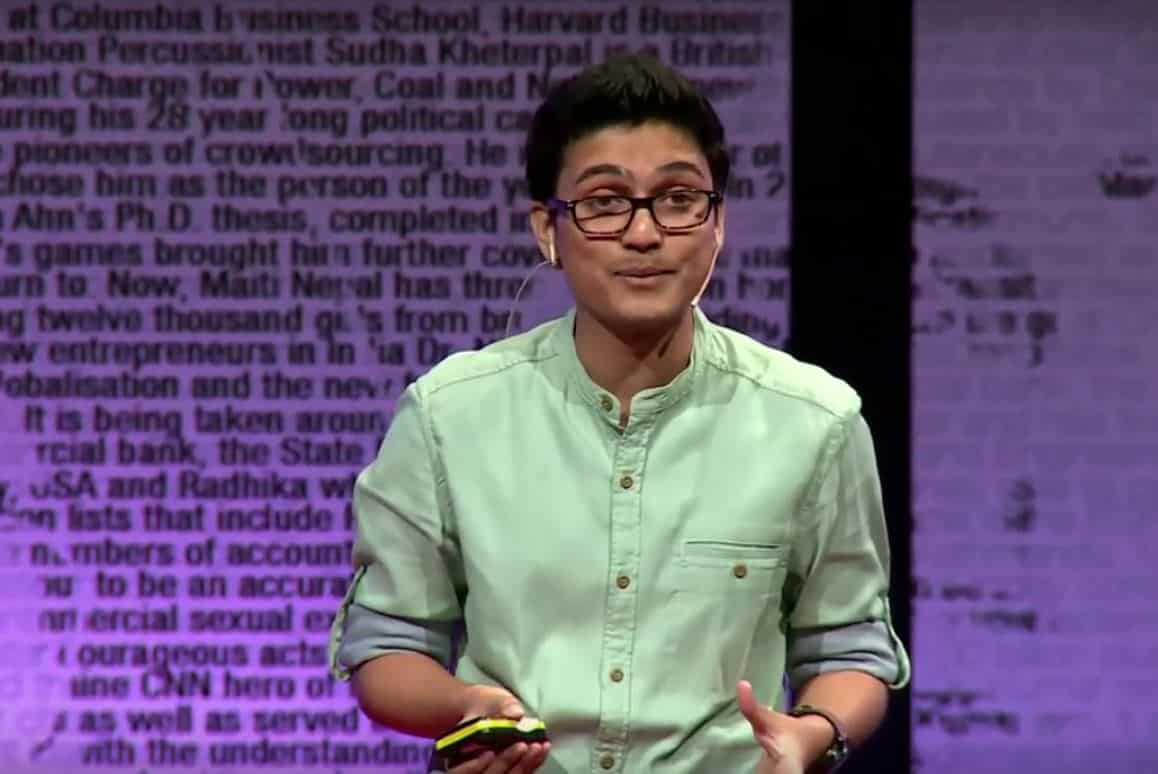
Deepak Ramola is the Founder & Artistic Director of Project FUEL. FUEL stands for: Forward the Understanding of Every Life Lesson. Deepak started Project FUEL at the age of 17. From victims of human trafficking in Nepal to middle school children in Afghanistan to refugees in Europe, Deepak has been able to benefit more than 60,000 people all over the world. Deepak, is a United Nations speaker, two times TEDx speaker, an educator, a writer, actor, lyricist and a gold medalist in Mass Media studies from the University of Mumbai.
As a lyricist, Deepak is working on eight feature films. His debut film was ‘Manjhi, The Mountain Man’, along with ‘Time Out’ in 2015 and ‘Wazir’ in 2016. He was featured in the fifth season of the hit show “The Dewarists“. Team Estrade had an exclusive interview opportunity to know more about Deepak and Project FUEL.
- Tell us about Project FUEL? About your offerings – products, services, etc.?
Project FUEL is very experiential. We collect life lessons of people from around the world and we design those life lessons into interactive workshops and curriculum. From that sense, our product would be curriculum, talks, experiences and conversations, with different communities around the world and documenting human wisdom, at the core of it.
- What is your geographical range?
We are a global organization. We work across India. In the last 2 years, we have spread to Nepal, Afghanistan, Sweden, Germany, France and Hungary.
- What is the size of the market (in CSR terms) you are currently competing in, both in India and the world? Meaning – The number of people who you plan to help with your current project.
We work with people aged 4 years to people aged 100. Our focus changes categorically, in terms of the people we are working with. So, this year we worked with mainly refugees and school students. Before that we worked with victims of human trafficking and sex workers. So, every year, we chose the market we work with. But, it is predominantly with adults, young adults.
- How you moved from Project FUEL to movies such as Manjhi, Wazir, etc.?
Actually, it has always been going simultaneously, and that’s the fun part of it. I get to juggle two, very different things. I get experience with both, the glamour world and the down side of humanity, the most challenging parts of our society. Both have been simultaneously, I love to write. Writing poetry, from the very beginning, I started at the age of 17 years. I have been writing since school, so, when I came to Mumbai, I started doing more theatre. Sometime in 2010, I wanted to work in films as a lyrics writer – write when a tune is given to me. So, I met music director Sandesh Shandilya. Of all the things that I presented to him in our first meeting, he liked. Then, two days later, he called me and told me, that he is working on the film, Manjhi the mountain man. He said that he would love to have my song in the film. So, that’s how it actually came about.
So, I juggled two, very happily!
- What is your strategy? In terms of reducing costs and making key stake holders aware of your work.
I think, that because it’s an experienced based project, the reducing of costs into the picture, by making sure that there are a lot of people who want to volunteer with Project FUEL, get the opportunity to do so. I try to create those experiences for stake holders, try to do long term partnerships with educational institutions, so that we are able to provide, organize guest lectures, talks with the institutions. We live with a lot of volunteers, which reduces our costs considerably.
- Is the eco system in India ripe for the success of your work?
I think, it is, but it is evolving. I think that the western market is more open to life skills and experiential learning. India is still warming up to it. That’s why India is the right place to work more aggressively, because the market is evolving. So, a lot of education system now is focused on life learning, value based learning. So, now it is evolving.
“spread of conflict zones runs throughout, be it natural calamity or man-made. At the core of it is human understanding and human dilemma”
- How do you compare your experiences in Nepal, with Afghanistan? What is the real common challenge among these?
The common challenge among these is conflict zone. I was working in Nepal during the earthquake, so, I was working with people’s emotions. I mean, in general, when you are asking somebody about their life lessons, you are sort of working with their vulnerabilities. The challenge lies in the fact that you make them feel powerful, when they open up to you about their vulnerabilities. So, in Nepal, it was a conflict zone, of course because of the natural crisis.
In Afghanistan, it was with the kids, whose schools were shut by the Taliban, so, it was a man made crisis, a crisis nevertheless. Same with the refugee crisis in Europe, it’s again a conflict. So, spread of conflict zones runs throughout, be it natural calamity or man-made. At the core of it is human understanding and human dilemma, and providing human solutions to human problems.
So, that’s how I would compare these experiences.
- Are the problems faced by humanity in different regions more or less the same? Who do you feel is the real culprit – Government, Corporations or we the common people?
Two parts of it…(laughing). To answer the first one, there is a beautiful quote by a guy named Terentius Afer from 150 BC. And the quote is “Homo sum, humani nihil a me alienum puto”, which roughly translates to, “I am human, and nothing of that which is human is alien to me”. If you ask me answer to all the problems faced by humanity, then this is my answer. A human being in Syria, whose house has been bombed, has lost his/her family and I have lost family in say a car accident or any tragedy like an earthquake in Nepal, then we all know what that loss is, and what it is to live without a family. Process of it might have been very very different.
Second observation that I have is that looking at people and conflicts from my experiences, I do not know who is responsible. However, I definitely know that we, do have the ability and means to rebuild life. And that’s what makes me hopeful. Because I know that there are 7.447 Billion people, which means that there are 7.447 billion problems, that same number also chose that there are 7.447 billion solutions….you know! That’s why I collect life lessons. If a person is facing a relationship issue, then he can be rest assured that there are more than 7 billion people who might have that one solution that can work to solve this problem. So, I am really bridging the gap between human problems and human solutions, within human beings, whether they are government or whether they are individuals. Just that belief that you are not alone and, that belief that another human being, in some part of the world, might have figured out a way out of your problems, is a good, I think, satisfying and a thing of contentment for sure.
“A lot of young people are taking charge of doing what they need to do, for society, for the community”
- In which geographical area do you have the maximum outreach?
I would say north India. A lot of educational institutions, so, north India.
- Who are your investors?
There is a no investor in Project FUEL right now.
- What is the biggest challenge faced currently by your projects and work?
I think, currently, we are at a stage where there is so much happening locally and globally. We are channelising the energies of people who are joining us. There is a lot of enthusiasm from all parts of the world. Collaborations and associations put them into perspective, into organisation goals and individual goals. I think, that this is one of the main areas, that we are focusing on, right now. So much is coming your way, that what do you say ‘NO’ to and what do you say ‘YES’ to? Everyone wants to be a part of this in one or the other way. How do you find out your immediate priorities and not spread out to everything. I think this is one of our biggest challenge so far.
- What are your expectations from the Government, both at the centre and at the state levels, for your work? Has the government done enough?
I can’t answer this one, mostly because I am a very political person. I don’t know what to say.
- What are your thoughts on the Government’s projects such as Affordable Housing, Slum Rehabilitation, etc.?
There is a lot happening. I am very hopeful. When I ask people, I notice that they are changing from tragic to pitiful circumstances, to more hopeful outcomes and more hopeful experiences. So, I am sure there is a positive shift that is happening. So, I am very hopeful about my work and with the communities I am working with. Also, there is a lot of young energy that is being associated to building the country. A lot of young people are taking charge of doing what they need to do, for society, for the community and this is along with the partnership and support of the government. I think that is the real crux and the encouragement for most of the people in my industry. So much of young energy and their so much of support.
- What would you advise to others who wish to foray in similar fields?
I would say, first of all is, start with what you have. Start with your family, start documenting their stories, then move on to your community, your building, your city, etc. Expand slowly, because it is a very personal thing. You do not need to be very visionary, just love the core of it. Second important thing is that understand that your talent is not the gift itself, but your confidence is. The understanding, that this as your responsibility and that you have to deliver on a task, irrespective of your feelings.
- What is your vision for the future?
For 2017, we want to be the largest within rural India. My focus is 2017 in India for sure. And for the next four years, other mediums to pass on projects through data and communication of learning that is happening. So, venturing into digital by digitization of a lot of content that we have, that’s the long term vision.
“Nothing of which is human is alien to me”, Deepak Ramola – Project FUEL






